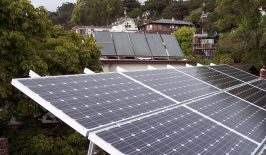If we’re ever going to be able to switch over to renewable energies and ditch fossil fuels for good, we will need reliable energy storage solutions to ensure a constant supply. But right now, the capacities of many storage systems are still relatively limited, while the storage technologies themselves are often simply too expensive. Siemens Gamesa Renewable Energy, an international manufacturer of wind turbines, wants to tackle one of the key issues stalling the shift to renewables: how to decouple energy production from its use.
Working together with scientists from the Institute for Thermofluiddynamics at the Hamburg University of Technology and the energy supplier Hamburg Energie, the company has developed an interesting storage technology. The principle behind the system is based on storing energy within heated stones. According to the company, this electrothermal energy storage system (ETES) lowers construction and operating costs to a fraction of the usual level for battery storage systems. The relatively low construction and operating costs would then be reflected in the electricity price. For commercial use, the target is to achieve a storage price of less than ten EUR cents per kilowatt hour.
Storage Capacity for Energy-Intensive Industries
The way it works is by converting energy into heat, which is then stored in volcanic rocks. A resistance heater and blower is used to superheat the approximately 1000 tons of crushed volcanic stones to a temperature of around 750°C. If there is a demand for energy, the stones can be used to heat water which powers a traditional steam turbine and convert the heat energy back into electricity.
The energy stored in this way could supply a four-person household for around nine years or cover the daily energy requirements of 1,500 households. At the same time, the high storage capacity of the ETES will enable load management in line with demand for energy-intensive industries. Siemens Gamesa told RESET that it wanted to extend the discharge time of the stone storage system from 24 hours to a whole week in the future.
The facility, which is funded by the German Federal Ministry of Economics and Energy, was opened on June 12 in the Port of Hamburg. The demonstrator unit was initially built for research purposes, but according to Hasan Ödzdem, Head of Technology Management & Projects at Siemens Gamesa, Hamburg Energie is also planning to operate it on the day-ahead market – the buying and selling of energy for the next day – and on the secondary energy control market.
Stone Storage as the Future of Decommissioned Power Plants?
From a sustainability perspective, this type of storage technology would have another advantage: According to the company, the principle of heat recovery means that stone storage facilities like this can be installed in decommissioned conventional power plants – turning them into high-performance green energy storage facilities. As Ödzdem explained to RESET:
“A large part of the existing power plant technology (steam turbine, generator, grid connection) could be retained. That’s the advantage. The incinerator would no longer be necessary. It would then be replaced by the storage facility.”
RESET has already covered a very similar approach just recently: the Scottish start-up Gravitricity that is converting disused mine shafts into energy storage facilities.
This is a translation of an original article which first appeared on RESET’s German-language site.







